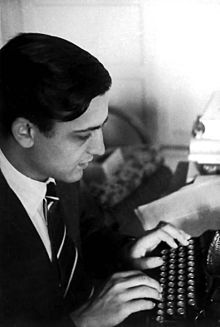Luis Martín-Santos
Luis Martín-Santos Ribera (born November 11, 1924 in Larache , Morocco , † January 21, 1964 in Vitoria , Spain ) was a Spanish writer and psychiatrist . His novel Tiempo de silencio (1961) ushered in the renewal of Spanish literature in the 1960s .
Life
Luis Martín Ribera (who would later change his name to Luis Martín-Santos Ribera) was born on November 11, 1924 in Larache (Morocco). In 1929 his family moved to San Sebastián , where Luis attended school and graduated from high school. To study medicine, he first went to Salamanca , where he graduated summa cum laude in 1946 as the youngest doctor in Spain. He was supposed to train as a surgeon in Madrid , but then, under the influence of German philosophy, opted for psychiatry (his dissertation, completed in 1953, deals with the influence of Wilhelm Dilthey on Karl Jaspers and psychoanalysis ). He completed his doctorate in Madrid under the direction of Pedro Laín Entralgo . From 1946 to 1949 he also worked at the Consejo Superior de Investigaciones Científicas and came into contact with recognized scientists such as Juan José López Ibor and Carlos Castilla del Pino. In Madrid he also met the budding writers Rafael Sánchez Ferlosio , Ignacio Aldecoa , Alfonso Sastre and Juan Benet , with whom he frequented coffee houses such as Gijón, Gaviria, Espérides and Gambrinus.
After studying in Heidelberg , he was appointed head of the San Sebastián psychiatric sanatorium in 1951. In 1953 he married Rocío Laffón, who would die of gas poisoning ten years later. In the late 1950s and early 1960s, Luis Martín-Santos was arrested several times for doing propaganda for the PSOE, a socialist party on whose board he was a member. In 1958, 1959 and 1962 he was imprisoned in Carabanchel in Madrid.
On February 21, 1964, Luis Martín-Santos was killed in a car accident in Vitoria.
plant
The main literary work of Luis Martín-Santos is the novel Tiempo de silencio (German: Schweigen über Madrid , 1991), which was first published in Mexico in 1961 because of the censorship prevailing in Spain , in a "toned down" version shortened by 20 pages in Barcelona where the full, uncensored text was finally published in 1981. For the Spanish literature of the 20th century, this novel signifies a paradigm shift insofar as literary innovations such as the inner monologue , the so-called stream of consciousness and the use of the second person in the narrative speech for the first time after the neorealism of the 50s that dominated Spain were introduced. Martín-Santos himself called his method "realismo dialéctico", dialectical realism. The prescribed silence of the generation after the civil war is already addressed in the title. The novel was translated into numerous languages and filmed by Vicente Aranda in 1986.
The author has also written more than 50 scientific articles and two specialist books on surgery and psychiatry as well as numerous essays on literature, politics and anthropology .
novel
- Tiempo de silencio : first edition 1961 in Mexico; Spanish edition: Barcelona: Seix Barral, 1961 (Biblioteca Formentor); newer edition: 18th ed.Barcelona: Seix Barral, 1981. (Biblioteca Breve)
- Tiempo de destrucción , unpublished during his lifetime, edited posthumously and provided with a foreword by José Carlos Mainer. Barcelona: Seix Barral, 1975. (Biblioteca Breve)
stories
- Apólogos y otras prosas inéditas. Edición y prólogo de Salvador Clotas. Barcelona: Seix Barral, 1970. (Biblioteca Breve; 295)
Poetry
- Grana gris . Madrid: Afrodisio Aguado, 1945.
Reference books
- Dilthey, Jaspers y la comprensión del enfermo mental. Madrid: Paz Montalvo, 1955. Print version of his dissertation
- Libertad, temporalidad y transferencia en el psicoanálisis existencial: para una fenomenología de la cura psicoanalítica . Carlos Castilla del Pino's Protocol. Barcelona: Seix Barral, 1964. (Biblioteca Breve; 197)
German translation
- Silence about Madrid . Translated from the Spanish by Eugen Helmlé. Frankfurt am Main: Eichborn, 1991 ( The Other Library ; Vol. 81). ISBN 3-8218-4081-1
literature
- Hans Ulrich Gumbrecht : “The power of myth prevails over Franco. A Spanish novel as huge as 'Ulysses': In 1961 Luis Martín-Santos published 'Tiempo de silencio', which appeared in German as 'Schweigen über Madrid' ", in: Frankfurter Allgemeine Zeitung of May 7, 2011, Pictures and Times, Z 3
- Gorrotxategui, Pedro: Luis Martín-Santos, historia de un compromiso , San Sebastián: Instituto Dr. Camino de Historia Donostiarra, 1995.
- Labanyi, Jo: Ironia e historia en "Tiempo de silencio" . Madrid: Taurus, 1985.
- Rey, Alfonso: Construcción y sentido de "Tiempo de silencio" . Madrid: José Porrúa Turanzas, 1977.
- Suárez Granda, Juan Luis: Tiempo de silencio. Luis Martín-Santos . Madrid: Alhambra, 1986.
- Morales Ladrón, Marisol: Las poéticas de James Joyce y Luis Martín-Santos: Aproximación a un estudios de deudas literarias. Bern etc .: Peter Lang, 2005 (Perspectivas hispánicas; 20). ISBN 3-03910-357-1
See also
Web links
- Literature by and about Luis Martín-Santos in the catalog of the Ibero-American Institute in Berlin
- Literature by and about Luis Martín-Santos in the catalog of the German National Library
- Literature by and about Luis Martín-Santos in the catalog of the library of the Instituto Cervantes in Germany
- Albrecht Buschmann in the Saarbrücker Zeitung 1992 on the German translation of Tiempo de silencio
| personal data | |
|---|---|
| SURNAME | Martín-Santos, Luis |
| ALTERNATIVE NAMES | Martín-Santos Ribera, Luis (full name) |
| BRIEF DESCRIPTION | Spanish writer and psychiatrist |
| DATE OF BIRTH | November 11, 1924 |
| PLACE OF BIRTH | Larache , Morocco |
| DATE OF DEATH | January 21, 1964 |
| Place of death | Vitoria , Spain |
